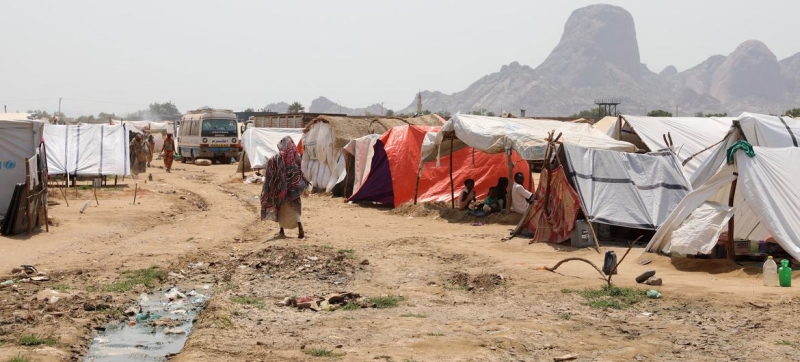- BNP moves to finalise seat sharing as alliance friction grows |
- BNP plans universal 'Family Card' for all women: Tarique Rahman |
- Tangail saree weaving gets recognition as intangible cultural heritage |
- Chuadanga farmers thrive as cauliflower yields hit new high |
- Jamaat and allies set to begin seat-sharing discussions from Tuesday |
‘You Can Run – But We Will Find You,’ Militias Warn Civilians

Women and girls undertake long journeys to flee violence in Gedaref state in Sudan © UNFPA
Help is urgently needed to halt a deadly cholera outbreak sweeping across Sudan, UN agencies said on Friday, warning that communities continue to be terrorised by parties to the conflict—even as they flee violence.
“People told me multiple times that when they were fleeing from Zamzam [displacement camp], armed people would threaten them while they were in flight, saying, ‘Flee, go to that place, run here, run there—we will follow you, we will find you’,” said Jocelyn Elizabeth Knight, a Protection Officer for the UN Refugee Agency, UNHCR.
Speaking to journalists in Geneva, Ms Knight described her conversation with a traumatised child at a UNHCR shelter—an experience mirroring the stories of countless other young survivors across the country.
“A tiny boy told me, ‘You know, during the day things are okay here, but I’m afraid to go to sleep at night in case the place where we're living is attacked again’.”
Forced into squalor
In Darfur, western Sudan, many people uprooted by violence have taken shelter in abandoned public buildings, lacking basic access to clean water and sanitation.
Meanwhile, new waves of displacement and attacks on civilians continue in Darfur and the neighbouring Kordofan region, UNHCR warned, in areas already devastated and subjected to unspeakable atrocities.
Ongoing conflict has severely hindered humanitarian access and disrupted aid delivery for over two years. With the seasonal rains now underway, many roads will become impassable for months—further complicating relief efforts.
The prolonged insecurity has also prevented agricultural activity, worsening deprivation in areas already facing famine or famine-like conditions.
According to the latest UNHCR data, more than 873,000 Sudanese refugees have crossed from Darfur into Chad—now hosting the largest number of registered Sudanese refugees since the conflict began. In eastern Chad, one in every three people is now a refugee.
Deadly disease spreading fast
In addition to the heavy fighting between the Sudanese Armed Forces (SAF) and the former allies-turned-opponents, the Rapid Support Forces (RSF) paramilitaries—civilians are now grappling with a fast-spreading cholera outbreak.
“Cholera has swept across Sudan, with all states reporting outbreaks,” said Dr Ilham Nour, Senior Emergency Officer at the World Health Organization (WHO). Since July last year, nearly 100,000 cases have been reported.
The highly contagious disease thrives in unsanitary conditions. As of early August, 264 cases and 12 deaths were confirmed in Dougui refugee settlement in eastern Chad, which hosts many Sudanese arrivals from Darfur.
Suspected cases have also been reported in surrounding villages and in Treguine settlement, another UNHCR-run camp in eastern Chad.
Lives on the line
UNHCR’s Dossou Patrice Ahouansou, Principal Situation Coordinator for Eastern Chad, underscored the urgency of the crisis.
“We still have more than 230,000 refugees at the border in a very difficult situation,” he said. “Without urgent action—including improved access to medical treatment, clean water, sanitation, hygiene, and most importantly, relocation from the border—many more lives are at risk.”
To help contain the disease and prevent further spread, UNHCR has temporarily suspended refugee relocation from border entry points.
The agency is seeking $130 million in flexible funding to provide life-saving assistance to an estimated 800,000 people in Darfur. This includes support for the cholera response and relocation of 239,000 Sudanese refugees from the Chad-Sudan border.
Landmines and unexploded ordnance
Meanwhile, the UN Mine Action Service (UNMAS) confirmed rising fears that unexploded weapons from ongoing battles are killing and maiming civilians—many of whom are unaware of the dangers they face.
“The sad reality is that this conflict is not happening in remote areas. It’s mostly in urban, densely populated zones,” said Mohammad Sediq Rashid, Chief of UNMAS Sudan.
Just last week, six minefields were confirmed in Khartoum, three of which contained anti-personnel landmines—the first such confirmation since the conflict began.
“Contamination is everywhere—on roads, in homes, schools, airstrips, medical facilities, and humanitarian bases,” Rashid said. “This population is largely unaware of the dangers that await them. And this problem is only growing by the day.”

